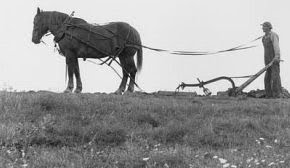 We continue our Series on Luke 9:51-62 today with a word study…
We continue our Series on Luke 9:51-62 today with a word study…
Before we get into a verse by verse examination of
the text of the three would be disciples in Luke 9 there is a word used in this passage that is fairly uncommon in the New Testament we
should look at. The word ἄροτρον appears only one time in the New Testament, and that is in verse 62. It occurs in the Septuagint in 1 Chronicles 21:23, Sirach 38:25, Micah 4:3, Joel 4:10, and Isaiah 2:4. It has been translated “plow” in Luke.
Luke uses this word where no one else does and he is making a very strong point with it. To understand what Luke is trying to tell us where is a need to examine the word as closely as we can. First let’s explore the variety of ways it is used in the Septuagint
- In 1 Chronicles 21:23 we read of Ornan giving ἄροτρον as wood for the offering of his Ox. The word is often translated as “threshing implements.”
- In Micah 4:3, and Isa. 2:4 the word is used to describe the beating of swords into “plowshares.”
- In Joel 4:10 it is used to describe the opposite. “Plowshares” are beaten into swords.
- Sirach 38:25, which is from the “Old Testament Apocrypha” is situated among verses referring to how laborers are important for society but will never be wise, judges, or rulers. The word is translated here as “plow.”
In the above examples it is used as a symbol for peace far more then any other example. One creates ἄροτρον in times of peace and destroys ἄροτρον in times of war. As you can see, giving spiritual significance to the plow was not not without precedent in the Old Testament. You can also see spiritual illustrations for plowing in Isaiah 28:24-26, Proverbs 20:4 as well.
With this background lets look at ἄροτρον in the New Testament. Only two other places use the word “plow” in the New Testament. One is Luke 17:7 and the other is 1 Corinthians 9:10. Both of these verses use ἀροτριάω A verb form of ἄροτρον. It is interesting that two of the instances where a plow or plowing are mentioned in the bible is in the Gospel of Luke. The other instance, in Luke 17:7, discusses the tool of a servant in service to his master. 1 Corinthians 9:10 comes in the midst of a discussion on receiving material support from the church. Paul uses plowing as an analogy to doing the work of the kingdom.
There is one other use of plowing in the Hebrew Bible that we must look at before we move on. Elisha was plowing when he was called by Elijah in 1 Kings 19:19-21. This passage a special significance in the pericope we are looking at in Luke. In Kings Elijah allows Elisha to say goodbye to his family, and he leaves the plow behind. Being a disciple of Jesus is not associated with the sword of war, or the mantle of a prophet in Luke 9. It is associated with a symbol of peace and service. Fitzmeyer contrasts the Cloak in the Elijah story with the plow here.1 I believe he does so rightly. Luke is using the image of the plow in a powerful way which differentiates the role of both Jesus and his disciples from that cast by the expectations of Elijah. There is work to be done in the kingdom of God.
notes
1 Fitzmyer, J. A. The Gospel According To Luke. 2 vols. Anchor Bible. (Garden City, N.Y.:
Doubleday, 1981), 837.
We continue our Series on Luke 9:51-62 today with a word study…












